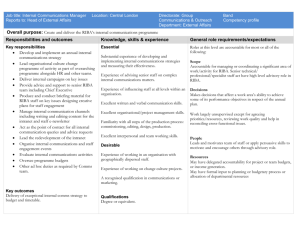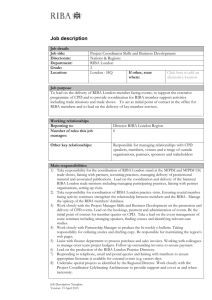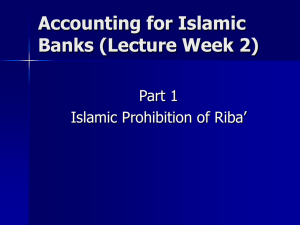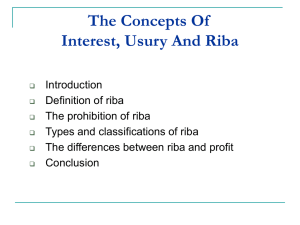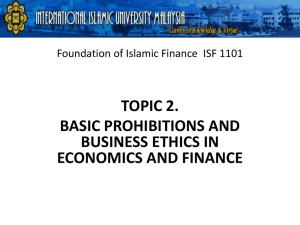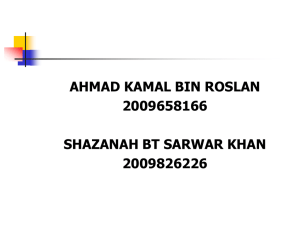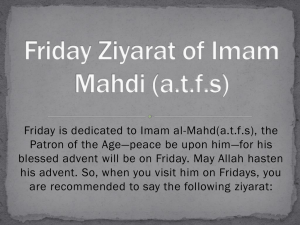TRADE IN ISLAM
advertisement
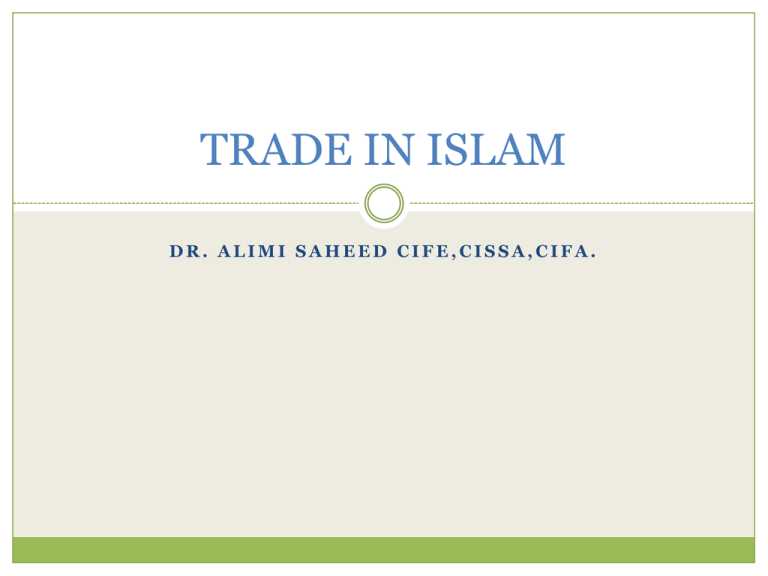
TRADE IN ISLAM
DR. ALIMI SAHEED CIFE,CISSA,CIFA.
Trade Transactions
Trade is permissible according to the Quran,
Sunnah, consensus of Muslim scholars and
analogical deduction.
Allah Says: “...but Allah has permitted trade..” (AlBaqarah:275)
And: “There is no blame upon you for seeking bounty
from your Lord” (Al- Baqarah:198)
Trade Transactions
• “ ...but only {in lawful} business by mutual
consent....” (Quran: An-Nisa: 29)
• “ Selling should be only by mutual consent”. (related
by Ibn Hibban, Ibn Majah)
• “ Do not sell what you do not have (or possess)’.
• “ Allah and His messenger prohibited the trade of
intoxicants, dead animals, pigs, and idols”. ( related
by Al- Bukhari and Muslim)
Legitimacy of Sales (Trading)
Qur’an Texts
Hadith Texts
The prophet was asked: which are the best form of
income generations? He replied: a man’s labour and
every legitimate sale. ( al-jami’ As-saghir).
The truthful and honest trader is among is among
the prophet , the righteous and the martyrs ( AtTirmidhi).
Salaf-as-Saliheen texts:
Imam ash-Shafi’i stated: the general rle for all sales
is permissibility as long as they are concluded by
consenting, capable decisions makers, except for
what the messenger of Allah has forbidden; or what
is sufficiently similar to what the messenger of Allah
has forbidden; anything different from those is
permissible following the permissibility of sales
stated in the book of Allah Almighty. (Al-Fiqh alIslami wa adillatuh).
Ethics of Trading
Avoidance of excessive profit.
Complete disclosure of information: all merchants
are resurrected on the of judgement as sinners,
except those who feared Allah, treated their
customers well and were truthful (at Tirmidhi).
Ease of conduct: Allah is merciful to the man who is
easy when he sells, when he buys and when he
collects his loans(Bukhari).
Avoidance of swearing even if truthful: swearing
destroys the goods and wipes out their blessings
(Bukhari/Muslim).
Frequent paying of charity: O merchants, the devil
and sins are present at each sales, so purify your
sales with charity (Abu Dawood).
Documentation and witnessing of all debts and
future contracts.
Trade Transactions
• “ ...but only {in lawful} business by mutual
consent....” (Quran: An-Nisa: 29)
• “ Selling should be only by mutual consent”. (related
by Ibn Hibban, Ibn Majah)
• “ Do not sell what you do not have (or possess)’.
• “ Allah and His messenger prohibited the trade of
intoxicants, dead animals, pigs, and idols”. ( related
by Al- Bukhari and Muslim)
Basic Concept of Trade
‘Iwad (counter value)
Ghorm (risk)
Kasb (effort)
Daman (guarantee)
Conditions for a valid sale
Halal products
Ownership of commodity
Existence and possession of Commodity
Valid contract
Haram Trade
Habali-il-habala
Musabada ( fresh for dry date)
Muhaqala (sale of wheat in ears)
Selling of animated pictures
Sale of pigs/dead animals
Mulaamasa
Bay’ al -Ina
Types of Invalid Sales
Sale of a non existent object
Sale of undeliverable goods
Sale of liabilities(including debts)
Sale of liabilities with a deferred price
Sale of IOUs
BASIC PRINCIPLES OF IF
It is based on the following principles:
Prohibition of RIBA
Application of AL-BAY’
Avoidance of GHARAR
Prohibition of MAYSIR
Prohibition from HARAM TRADE
RIBA
Definition of Riba
Types of Riba
Prohibiting Dealing in Riba
Definition of Riba
The lexical meaning of “riba” is “increase”.
Allah (SWT) said: “But when we pour down rain on
it, it is stirred to life, and it swells (rabat){22:5}.
Thus, the growth that comes forth from the ground is
labelled as riba.
The definition of Riba covers both riba al-nasi’ah as
well as defective sales.
Prohibition of Riba.
Riba is forbidden in the Quran, as stated in the
verses {2:275-279}:
Those who devour usury (riba) will not stand except
as stands one whom the Evil One by his touch hath
driven to madness. That is because they say: ‘trade is
like riba’, but Allah hath permitted trade and
forbidden riba.
Prohibition of Riba Contd.
‘O you who believe, fear Allah, and and give up what
still remains of riba, if you are believers.
But if you do not, then take notice of a war from
Allah and His messenger but if you turn back, you
shall get your capital sums without increase or
decrease.{Q2:275-276 & 278-279}
Prohibition of Riba
‘Ibn Masud narrated that “the messenger of Allah
(saw) cursed the one who devours riba, the one who
pays it, the one who witnesses it, and the one who
documents it”.
Riba is like committing Adultery 36 times after the
advent of Islam.(Ahmad)
Riba is 72 degrees of (evil) the least of which
resembles committing adultery with ones mother
(Ibn Majah)
The Prophet (SAW) also says:
‘There will come a time for people when they will
consider riba lawful by means of trade’.
‘If you sell to one another with inah , hold the tails of
cows, are pleased with agriculture, and give up jihad
, Allah will make disgrace prevail over you and will
not withdraw it until you return to your
religion’.(Abu Dawud)
‘There will come a time when people will eat riba
even the one who will not eat it may not spare its
dust’.
Types of Riba
Riba al-nasi’ah(Delay Usury): this was the
only type known to pre-Islamic Arabia. This is the
riba collected in compensation for deferring a due
debt to a new term of deferment.
Types of Riba Contd.
• Riba al-buyu(Excess/Trade Usury), :It is also
known as riba al-fadl, which is the trading of one set
of goods that are eligible for riba for another set of
the same goods, with an increase of one
compensation over the other.
Riba al Fadl
The prophet (SAW) states this type of transaction is
prohibited in six items: “Gold is to be paid for gold,
silver for silver, wheat for wheat, barley for barley,
dates for dates and salt for salt, like for like and
equal for equal and payments is to be made hand for
hand.
The prophet also states, ‘if this classes defer, then
sale as you wish, if payment is made hand to hand.’
Islamic Finance Options
MUSHAARAKAH(PARTNERSHIPS)
MUDAARABAH
MURAABAHAH
IJAARAH
DIMINISHING MUSHAARAKAH
SALAM
ISTISNA’
Mushaarakah
This refers to partnerships, which involves partners
sharing in provision of capital, as well as profit and
loss.
Generally speaking, the profit and loss sharing is
based on ratio of invested capital.
It helps to dissipate risk among partners while
facilitating a large capital base for the project.
A lead partner may head and be paid his wages.
Mudarabah
This refers to silent partnership, where an investor
(rabb-al- maal) partners with an entrepreneur
(mudarib) in a business venture.
The rabb-al- maal funds the venture fully while the
mudarib manages the venture.
Profit sharing ratio is determined ab initio.
In event of a loss, the mudarib losses his efforts while
the rabb-al-maal losses his funds.
Murabahah
Cost Plus Sales
It refer to a sale where the buyer and seller are both
aware of the initial price, profit margin and requires
the price be fungible.
It is a form of trust sales.
It is used mainly to finance purchases of items like
cars, business equipments etc
It is usually a two stage process requiring a request
to purchase an item and then a resell to the client,
with a profit margin and repayment in instalment
usually.
IJAARAH
Lease
This refers to the transfer of ownership of permitted
usufruct for a known period in exchange for a
compensation.i.e.to give something on rent.
This is not a form of sale
However, an approved form of sale is the Al Ijaarah
thumm al bay’(AITAB/AIMAT)
AITAB is a lease with promise to sell.
It differs from conventional hire purchase
Diminishing Musharakah (DiM)
Another form of Musharakah, developed in the
near past, is ‘Diminishing Musharakah’.
In this concept, a financier and his client
participate jointly either in ownership of a
property, equipment, or in a commercial venture.
The share of the financier is further divided into a
number of units and
Diminishing Musharakah (DiM)
It is understood that the client will purchase the
units of the share of the financier one by one
periodically, thus increasing his own share till all the
units of the financier are purchased by him so as to
make him the sole owner of the property, or the
commercial enterprise, as the case may be.
It is widely used in house financing
SALAM
Salam is a sale whereby the seller undertakes to supply
some specific goods to the buyer
at a future date in exchange of an advanced price fully
paid at spot.
Here the price is cash, but the supply of the purchased
goods is deferred.
The buyer is called “rabb-us-salam”, the seller “muslam
ilaih”, the cash price is “ra’s-ul-mal” and the purchased
commodity is termed as “muslam fih”.
For simplicity, I shall use the English synonyms of these
terms.
SALAM
Salam was allowed by the Holy Prophet (SW)
subject to certain conditions.
The basic purpose of this sale was to meet the needs
of small farmers who needed money to grow their
crops and to feed their families up to the time of
harvest. After the prohibition of riba, they could not
take usurious loans ,therefore, it was allowed for
them to sell the agricultural products in advance
Benefits of Salam
Salam is beneficial to the seller, because he receives
the price in advance
It is beneficial to the buyer also, because normally,
the price in salam is lower than
the price in spot sales.
It is a viable tool capable of revamping the
agricultural sector.
It is a spectacular finance option capable of
transforming the real sector of the economy
especially the small and medium enterprises
ISTISNA’
Istisna’ is the second kind of sale where a
commodity is transacted before it comes into
existence.
It means to order a manufacturer to manufacture a
specific commodity for the purchaser.
It is necessary for the validity of istisna’ that the
price is fixed with the consent of the parties
and that necessary specification of the commodity
(intended to be manufactured) is fully
agreed to.
